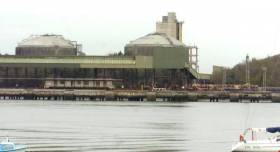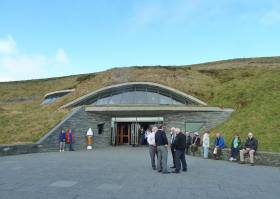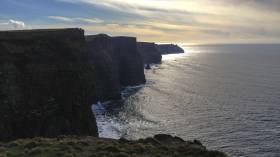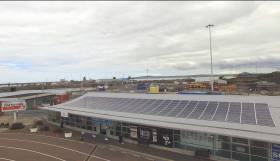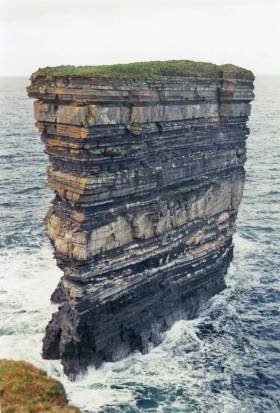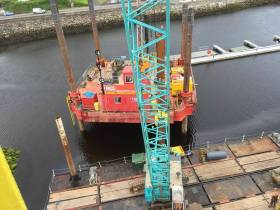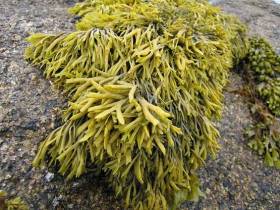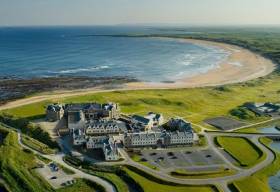Displaying items by tag: Coastal Notes
Killybegs Small Craft Harbour Officially Opens
#NewHarbour - The newly constructed Killybegs Small Craft Harbour which Afloat reported on during the summer was officially opened last week.
Minister for Agriculture, Food and the Marine, Michael Creed TD launched the official opening for the new marine project. ABCO Marine IRL had recently completed Phase 3 of the project, the works consisted of the provision and installation of steel tubular piles and floating breakwater pontoons.
Minister Creed said at the launch that, "The new harbour, fully funded by the state, is a first class facility capable of accommodating 63 boats ranging up to 15metres in length with one berth capable of accommodating larger vessels in excess of 20 metres long. This is a great development for Killybegs Harbour and will complement the existing world class facilities in place for our large fishing vessels".
€18m Redevelopment Plan in Cork Harbour Faces Delay
#SiteDelay - An €18 million plan in Cork Harbour to redevelop a key industrial site writes The Irish Times, faces a delay after the joint venture backing it withdrew its notification to the State’s mergers watchdog.
Port of Cork is leading a consortium that intends to buy the 114-acre Irish Fertiliser Industries’ (IFI) facility at Marino Point, close to Cobh, from the National Asset Management Agency (Nama) to redevelop as a facility to handle oil and farming products.
The port company and its partners, which include publicly quoted Origin Enterprises, withdrew their notification of the deal to the Competition and Consumer Protection Commission (CCPC) yesterday.
The move is likely to delay plans to redevelop the site, as deals on the scale they propose must get the commission’s approval before going ahead. Any plan for the IFI site will have to be notified to the commission again before proceeding.
For more on the story and that of the CCPC click here
Daring Burglary At Cliffs Of Moher Visitor Centre
#CliffsOfMoher - As much as €20,000 in cash is believed to have been taken in a sophisticated burglary at the Cliffs of Moher Visitor Centre yesterday morning (Monday 3 October).
According to The Irish Times, the building’s security system was disabled after the daring thieves cut its electricity supply, allowing them unfettered access to the visitor centre at one of Ireland’s leading tourist attractions.
Visitors were yesterday warned away from the Co Clare coastal beauty spot while ESB Networks technicians worked to restore power.
The Irish Times has more on the story HERE.
Public Consultation On Ireland's Second Aarhus Convention Report
#Aarhus - Environment Minister Denis Naughten has launched the public consultation for a second implementation under the UN's Aarhus Convention on community participation in environmental issues.
Ratified in June 2012 after a long call by environmental and coastal community campaigners, the Convention on Access to Information, Public Participation in Decision-making and Access to Justice in Environmental Matters lays down a set of basic rules to promote citizens’ involvement in environmental matters and improve enforcement of environmental law.
Its provisions are broken down into three pillars: Access to Information on the Environment; Public Participation in Environmental Decision-making; and Access to Justice.
In what his department says is an effort to keep with the spirit of the convention, Minister Naughten has called on the public, including environmental NGOs, to submit comments on the implementation of the Aarhus Convention in Ireland prior to finalising Ireland's second National Implementation Report to the United Nations Economic Commission for Europe (UNECE).
The purpose of this consultation is to provide the UNECE as well as the Aarhus Convention Secretariat and Compliance Committee with the widest possible range of views and opinions on issues related to the implementation and promotion of the convention in Ireland.
The Department of Communications, Climate Action and Environment website has the draft report and details of the consultation, for which comments should be submitted no later than 5pm on Friday 28 October.
Solar Support Deployed at Stena's Port of Holyhead
#SolarPort - As part of a drive to become the world’s greenest ferry operator, Stena Line has just delivered an innovative solar project at its Port of Holyhead in Wales.
The project involved the fitting of four 50kWp Solar PV panel arrays to the roofs of terminal buildings, garage and shore shop. Stena Line teamed up with Eco Environments Ltd, a grid-connected and off-grid power specialist. The project was completed on time and on budget over a 4-week period during the summer with no interruptions to the port nor business to daily ferry operations.
The energy efficiency stats and associated carbon reduction levels around the project are impressive. It estimated that the panels will saved approximately 89 432 kg CO2 annually, provide 164 400 kWh of electricity for use onsite and will provide a yearly benefit worth £27,276 in electricity savings together with additional government feed-in tariff revenue. The pay back for the system is estimated to be less than seven years.
Wyn Parry, Stena Line Port Manager, Holyhead, said: “This is a very innovative and exciting project for us to be associated with. Initiatives like this one point the way forward and, as a company, we need to focus on it if we are to achieve our vision of becoming the greenest ferry operator in the world. While the savings themselves are relatively modest from a financial perspective, if we look at this as a small project within a much more comprehensive approach to future sustainability then I think it’s an important step forward and one that I’m sure can be easily replicated across other parts of the Stena Line and wider Stena Group businesses.”
Sea Stack Scaled By Adventurous Climbers For First Time In 25 Years
#SeaStack - A famous sea stack off the Co Mayo coast has been climbed for the first time in more than 25 years, as Independent.ie Travel reports.
At the end of August, Iain Miller and his climbing partner Paulina Kaniszewska reached the top of Dún Briste, off Downpatrick Head, in what was the third attempt by the former to summit the 50m rock.
One of the more breathtaking spots along the Wild Atlantic Way, it's also considered a particularly dangerous climb that should only be attempted by experts.
But for Miller, the rewards for scaling the summit of a place that has seen fewer visitors on record than men on the moon were more than he could put into words.
Independent.ie Travel has more on the story HERE.
Exhibition: Glas Journal 2016 – Deep Mappings of Dun Laoghaire Harbour
#Exhibition - For Glas Journal 2016, two series of handmade books will be displayed in the National Maritime Museum of Ireland, Dun Laoghaire, within an installation of projected harbour arms, forming a ‘place ballet’ of familiarity and attachment.
The journals (exhibition between 10-25 September) have been made through collaborations with people who live, work and feel associated with different locations in Dún Laoghaire Harbour.
Participants included: former and current residents of the old Coast Guard Station; individuals who work or have worked with the Commissioners of Irish Lights; RNLI Life Boats volunteers and staff; personnel of the Ferry Terminal; the Quay Fish Shop; MGM Boats and the Marina; individuals associated with St. Michael’s Rowing Club.
In addition to the harbour’s four yacht clubs, Dún Laoghaire Motor Yacht Club; Royal Irish Yacht Club; Royal St. George Yacht Club; National Irish Yacht Club; and individuals employed by the Irish National Sailing School and the Dún Laoghaire Power Boat School.
A personalised 'Glas Journal' was made for each location and the books record what their harbour space means to these individuals. More than 30 participants agreed to take part in the documentation of ‘their’ place in the harbour.
For more information on the project, click here
Work Underway On Small Craft Harbour at Killybegs
#KillybegsProject - A marine piling project is underway in Killybegs, Co Donegal on phase 3 of the small craft harbour.
The contract to ABCO Marine at the Killybegs Fishery Harbour Centre that began late last month, is on behalf of the Department of Agriculture, Food and the Marine (DAFM).
The works will include the provision and installation of stell tubular piles and floating breakwater pontoons, associated connections and ancillaries. Additional works are also required to integrate phase 3 installation with the previous phase 1 and 2 pontoon arrangements.
ABCO's marine plant involves the C57 Red Squirrel jack-up barge, a transfer barge, support work boats to support the piling operations.
The works according to ABCO are progressing to programme, with the piling to be completed this month, in advance of the new floating pontoon installation.
#Seaweed - Could breathing in the iodine released by seaweed on Ireland's coasts be improving our health?
The answer is quite possibly, according to new research as reported in The Irish Times this week.
Scientists at UCD and NUI Galway have concluded that iodine levels are highest among those regularly breathing coastal air rich in seaweed, which concentrates iodine from seawater.
Their paper in the Irish Medical Journal was informed by two decades of studies in three different environments in Ireland: coastal cities (Dublin, Belfast, Galway), inland areas (Mullingar and Dungannon) and seaweed-rich Carna in Co Galway, where almost half the population has iodine intake above the WHO recommended level.
The Irish Times has much more on the story HERE.
#Doonbeg - Controversial proposals for coastal defence works at Donald Trump's Doonbeg golf resort have not been proved necessary, according to the Department of Arts, Heritage and the Gaeltacht.
As The Irish Times reports, the department's submission to Clare County Council makes note of the "complex mosaic" of Doonbeg's dune habitats, a Special Area of Conservation and home to a protected rare snail species, suggesting that any physical interference by way of a rock wall or 'berm' would result in shifting sands and other significant changes.
“The case has not been made to prove that the rates, patterns and causes of erosion at the site warrant the type and scale of the solution proposed," the submission adds.
Earlier this month Doonbeg residents came out overwhelmingly in favour of the coastal defence works, which Trump's representatives say are required for the continued operation of the resort the property tycoon and US presidential hopeful purchased in February 2014.
The 2.8km, 200,000-tonne rock barrier is opposed by various groups beyond the Co Clare village, including the local Save Doughmore Beach Protection Group. More on this story in The Irish Times.



























